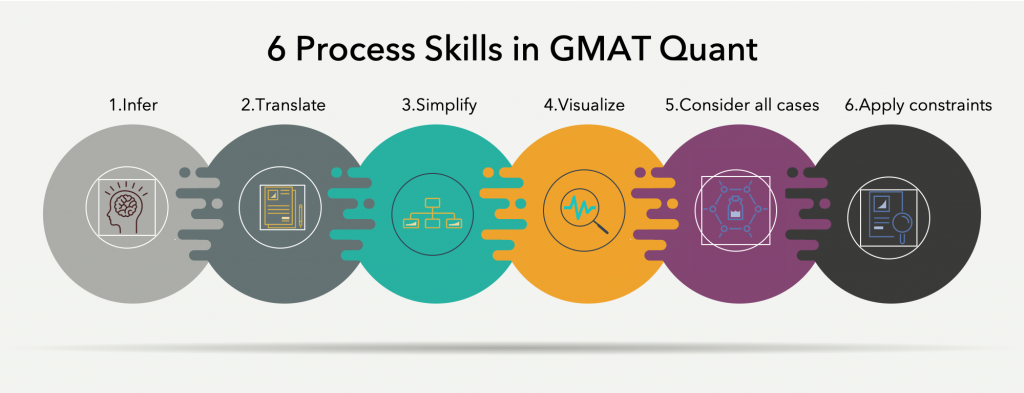I am going to start this article by making a statement, and I want you to tell me if you agree with it. The mantra to master GMAT quant or GMAT Math is to learn the concepts that are typically tested on the GMAT and then practice as many questions as one can.
I am very confident that you would wholeheartedly agree with the above statement. After all, that is the way we have been learning all our lives. So why should GMAT Quant be any different?

Well, the truth is that the mantra described above not only is very inefficient but also does not always produce favorable results. And this is the reason why, at e-GMAT, we follow a different mantra, which is woven into the very fabric of our verbal and quant courses.
Here is the e-GMAT mantra marked up from the above one. Notice the highlighted changes.
The e-GMAT mantra to master GMAT Quant is to learn the concepts that are typically tested on the GMAT, master the process skills that are required to solve GMAT questions and practice only the required number of questions to reach one’s target ability in every sub-section.
As you can see, there are two main points of difference:
- The e-GMAT mantra includes the mastery of process skills that are absolutely essential to solve GMAT questions.
- Per the e-GMAT mantra, one does not need to solve as many questions as possible. On the contrary, one needs to solve only those many questions that are necessary to reach one’s target ability.
This article explores the first point of difference – the “process skills.” Our goal is to help you recognize the value of the process skills. And once you do understand the importance of these skills, we will guide you about how you can build these skills so that you reach your target score in Quant.
To summarize this section, we will mathematically present the e-GMAT mantra to success in Quant.
Mastering GMAT quant = conceptual knowledge + mastery of process skills.
Here are a few tips to score Q50+ on the GMAT
Did you know a GMAT score of 730+ yields incremental $500K in ROI? Start your GMAT Preparation by Signing up for our FREE Trial and get access to FREE online GMAT preparation resources. We are the most reviewed GMAT preparation company on GMATClub with more than 1870 reviews.
Process Skills to ace GMAT Quant
Before we go into the “what” of the process skills, let me explain the “how”- i.e., how do process skills help you reach your target score.
Let’s set some background – I think it will be fair to assume that all of us know the importance of learning the concepts. So, for the sake of this discussion, let’s assume that your conceptual knowledge is solid.
Now, I want you to ponder about these two questions:
- Have you ever wondered why you make a mistake despite having the conceptual understanding?
- Have you ever wondered why it is that you need to solve thousands of questions to master GMAT Quant?
Here are the answers:
- You make a mistake not because you don’t know the concept, but because you do not know how to apply that concept.
- Likewise, you need to solve so many questions to reach that level of ability despite knowing the concepts since you have not learned the method to apply those concepts to solve GMAT questions, and that is why you need to practice and practice with the hope that you will reach your target score. And you know by experience that this approach is a hit or a miss.
So how do you solve this problem of “application”?
This is where “process skills” come into the picture. To learn how to APPLY these concepts, you need to learn these process skills. And as you master these process skills, your ability to answer GMAT questions improves.
After thousands of hours researching the official content, we have formulated six process skills that you need to master to solve difficult quant questions with ease and accuracy.
Here are the six process skills to prepare for GMAT Quant section:
- Infer
- Translate
- Simplify
- Visualize
- Consider all cases
- Apply constraints

In this article, we will outline each of these skills, and then over the next few weeks, we will delve into each process skill in detail.
Six process skills to master GMAT quant are Infer, Translate, Simplify, Visualize, ‘Consider all Cases’, and ‘Apply Constraints.’
Applicability of Process Skills
These process skills are applicable across all sub-sections of Quant and both types of quant questions – PS and DS. So, as you master them in the context of one sub-section, you will notice that your proficiency in those skills will improve in the other sub-sections. To offer a simile, building these process skills is akin to building a muscle, as you build a muscle in the context of one sport say tennis, your performance also improves in other sports, such as racquetball or squash.
Mastery of process skill in one sub-section carries forward to other sub-sections.
Learning Process Skills to master GMAT Math
Before I explain each of the process skills, I want to make sure that you do not feel burdened by the prospect of learning something brand new. In fact, it’s quite the opposite. Mastering process skills is a very logical activity, one that focuses on re-channeling your existing resources – i.e., your conceptual knowledge – to maximize their output.
Mastering process skills is a logical process that re-channels your conceptual knowledge to maximize your ability to solve GMAT Math questions.
Process Skill 1 – Infer
“Infer” Definition
Given the information in the question and your conceptual knowledge, what can you deduce so that you come closer to the solution of the question.
One needs to continually infer or deduce throughout the solution – not just in the beginning, not only in the middle, and not just in the end. As you learn to apply this process skill, you learn to stay actively engaged while solving the questions. This, in turn, helps with the timing aspect of the test.
We will take an example to demonstrate this process skill to you. Solve this 700-level question.
Process Skill 2 – Translate
“Translate” Definition
Converting English into Mathematical form and vice versa, utilizing your conceptual knowledge.
Primary function of GMAT Quant questions is to test your quantitative ability. But they also test your understanding of English language in the context of how comfortably you can convert English to Math and Math to English.
Naturally, given the nature of this process skill, it is applied usually in the beginning of the solution to convert the English to Math or towards the end of the solution to convert the Math to English.
We will take an example to demonstrate this process skill to you. Solve this 700-level question. This question is from the Official Guide Advanced book.
Process Skill 3 – Simplify
“Simplify” Definition
Converting complicated-looking expressions into a simple form.
Solving a question in a methodical manner requires that we convert complex looking expressions into simpler forms and that is why mastering this skill is very important. In fact, this is a key skill to succeed in life as well. Breaking down complex situations or problems into simpler small problems facilitates effective solutions!
We will take an example to demonstrate this process skill to you. Solve this 700-level question. This question is from the Official Guide Advanced book.
Process Skill 4 – Visualize
“Visualize” Definition
Putting information in a visual form such as a figure, a table, a chart, a venn diagram, etc. to make the analysis easier.
This skill is very essential, especially when the given information appears to be an overload on our mental faculties. In some way, we are ‘simplifying’ the complex information in a visual form so that we can make better sense of that information.
We will take an example to demonstrate this process skill to you. Solve this 700-level question. This question is from the Official Guide.
Process Skill 5 – Consider all Cases
“Consider all Cases” Definition
While evaluating a relationship, we must consider all the applicable cases that could impact our evaluation of that relationship.
This skill is very essential while solving both PS and DS questions.
We will take an example to demonstrate this process skill to you. Solve this 700-level question. This question is from Official Guide Advanced book.
Process Skill 6 – Apply Constraints
“Apply Constraints” Definition
Consciously identify the constraints on variables in the question, based on the information in the question statement and based on your conceptual understanding.
There are two kinds of constraints that one needs to be cognizant of.
- Constraints per the information in the question statement.
- Constraints per the conceptual understanding such as square of a number is always a non-negative number.
We will take an example to demonstrate this process skill to you. Solve this 700-level question. This question is from the Official Guide.
Concluding remarks
You would have now gotten a flavor of these process skills. Over the next few weeks, we will publish articles so that you get more accustomed to each of these skills.
In fact, you can start applying these process skills starting today – I recommend taking a printout of this attachment and stick it in your study area so that you consciously remind yourself to apply these skills. As you start applying them, these skills will become second nature to you, and you will realize that mastering these process skills is a matter of developing good habits. Also, do a thorough strategic review of solutions and make an explicit mapping of the mistake to one of these process skills and/or conceptual gaps. Such analysis will take you to that next ability level in your preparation.
And with focused content that helps you master these skills, in no time you will be on your way to conquering GMAT Quant.
So, get on the journey to master these process skills.














